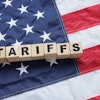
ContractPodAi launched Leah Tariff Agent, a new solution that empowers corporations to proactively navigate the complexities of evolving global tariffs and trade regulations.
“In today’s volatile global trade environment, businesses need more than just awareness; they need the power to act decisively,” says Sarvarth Misra, CEO and co-founder of ContractPodAi. “The Leah Tariff Agent delivers that power. By leveraging agentic AI to provide immediate, precise insights, Leah enables our clients to move beyond passive risk management and instead proactively identify and pursue all available avenues for legal recourse, ensuring their contractual rights are protected and their strategic interests are secured.”
Key takeaways:
· Leah Tariff Agent strategically addresses the intertwined needs of procurement, legal, and finance teams, significantly enhancing an organization’s overall resilience.
· For procurement, Leah safeguards supplier costs and identifies hidden tariff risks that could erode margins or disrupt sourcing strategies.
· For legal, it strengthens contract risk management capabilities and provides audit trails for defensible decision-making and the ability to pursue legal recourse to protect the organization’s interests.
● Leah identifies supplier details and manufacturing origins to assess geographic diversity and potential exposure to high-risk regions.
● Leah clarifies tariff payment responsibilities between buyer and supplier, including obligations triggered by new government regulations.
● Leah highlights delivery terms such as Delivered Duty Paid (DDP), where the supplier assumes responsibility for tariffs, transportation, and delivery, directly translating into minimized legal and financial risk for the buyer and strengthening their position in potential disputes.
● Leah identifies and maps all available legal remedies specific to tariff changes within each contract. This analysis includes price escalation protections and notification requirements, force majeure activation pathways with required evidence standards, termination rights with optimal timing strategies, renegotiation triggers based on tariff thresholds, and price adjustment rights with enforcement protocols.
● Leah analyzes dispute resolution mechanisms, identifying risks such as the omission of mediation steps, unclear arbitration timelines, or unfavorable cost allocations.


















![Pros To Know 2026 [color]](https://img.sdcexec.com/mindful/acbm/workspaces/default/uploads/2025/08/prostoknow-2026-color.mduFvhpgMk.png?ar=16%3A9&auto=format%2Ccompress&bg=fff&fill-color=fff&fit=fill&h=135&q=70&w=240)

